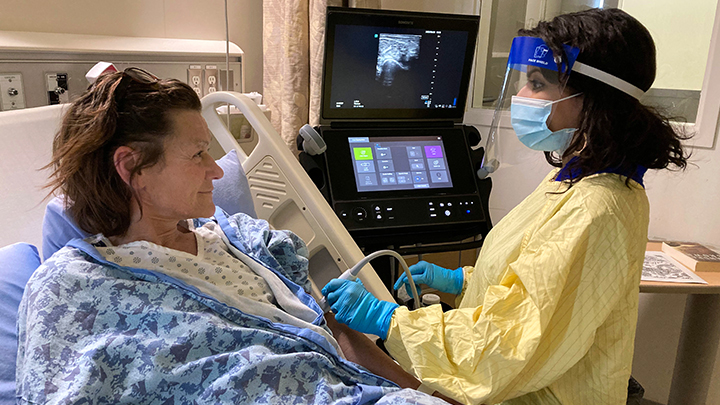
August 8, 2023

Safiya Nanji, clinical nurse specialist, uses a portable ultrasound machine to help guide an intravenous start in one of Tracy Olson’s veins. The equipment was made available as part of a $110,000 donation to purchase four machines for the Royal Alexandra Hospital medicine program. Photo by Sharman Hnatiuk.
Story & photo by Sharman Hnatiuk
EDMONTON — Needle pokes to start an intravenous (IV) are uncomfortable for most, but for patients like Tracy Olson, whose veins are often difficult for healthcare providers to access, the process can bring pain and anxiety.
Thankfully, the arrival of portable ultrasound machines to inpatient units at the Royal Alexandra Hospital means fewer pokes, as Olson’s care teams can now access technology to perform a faster, more efficient guided technique.
Olson has painful memories of a time when emergency department staff made at least 15 attempts to start an IV — but the veins in her arm proved so difficult to access that her care team moved on to her leg.
“Now they use the ultrasound technique every time — and they can get it in one try,” says Olson. “It used to be so painful and stressful, but when they bring out the ultrasound, I know I can stay calm. The process is so much better.”
Olson was first introduced to the technique in the Royal Alex emergency department a few years ago and says she’s pleased that the availability of guided IV starts are spreading to more areas of the hospital.
As a clinical nurse specialist, Safiya Nanji teaches other nurses on the medicine units at the Royal Alex as they learn and hone their skills in using an ultrasound to guide an IV. Previously, if a nurse was having difficulty with an IV start on the unit, they would call the nurse educator team or Rapid Response Team – a healthcare team at the site who respond to medical emergencies – to assist with the start.
“With access to a portable ultrasound on the unit, our nurses have the ability to learn a new skill that greatly improves the patient experience for those with hard-to-access veins,” says Nanji.
“In a very short time, we helped our unit nurses gain the confidence to start an IV quickly and effectively, which freed up demand on the Rapid Response Team for more urgent calls throughout the hospital.”
Some individuals have small thin, or hard-to-find veins due to dehydration, poor circulation, increased fat layers under the skin, chemotherapy, radiation or dialysis. The use of ultrasound helps healthcare providers to easily identify veins and arteries.
Guided IV gives an exact visualization of the needle going into the vein, which prevents nicks or deviation of the vein. This technique is extremely helpful for patients with overused veins, including those with chronic health issues or a history of intravenous drug use.
“Another benefit of using an ultrasound is the ability to use a longer needle, extending the use of an IV from three days to upwards of two weeks,” adds Nanji. “This means a reduced chance of infection and fewer pokes, especially for our longer-term patients. It’s a win-win tool for both patients and providers.”
The Royal Alex medicine program purchased four new portable ultrasound machines thanks to a directed donation by MHCare Medical to the Royal Alexandra Hospital Foundation.